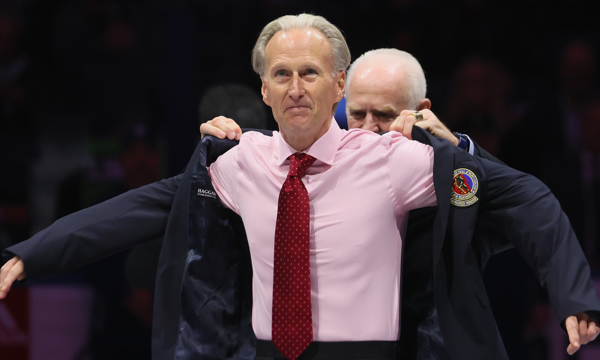Barrasso went 26-12-3 with a 2.85 goals-against average and a .893 save percentage during his rookie season, earning him the Calder and the Vezina Trophies. He was the third player to win both awards in the same year and the youngest goaltender to win the Vezina at 19 years old.
Barrasso spent five seasons with the Sabres before the Penguins traded for him during the 1988-89 campaign. Barrasso thanked Tony Esposito, then the general manager of the Penguins, who traded for the Hall of Fame goaltender.
“Tony believed in me,” Barrasso said. “He believed I’d be a difference-maker.”
Two years later, the Penguins won the franchise’s first Stanley Cup championship. Pittsburgh won it again in 1992, making Barrasso the second U.S.-born goaltender with multiple Stanley Cups.
“I’m forever grateful to Tony for the opportunity he provided to me,” Barrasso said. “It truly changed my life.”
Barrasso is currently tied for 20th all-time with 369 regular-season wins and tied for 15th with 61 wins in the playoffs. His 48 points, all assists, are also the most by a goaltender in NHL history.
After 12 seasons with Pittsburgh and a brief stint with the Ottawa Senators, Barrasso stepped away from hockey in 2001 and thought his career was done for good.
“In 2001, my father had passed away, my daughter Ashley had a recurrence with cancer and hockey was not on my mind,” Barrasso said. “After a season away from hockey, some former teammates encouraged me to make a comeback. I did and it was really a lot of fun.”
Barrasso played with the Carolina Hurricanes and Toronto Maple Leafs during the 2001-02 season. He also represented his country as a member of the U.S. Olympic Men’s Ice Hockey Team that took home a silver medal at the 2002 Winter Olympics in Salt Lake City.
“Being an Olympian is truly a highlight of my lifetime and I put it right beside my two Stanley Cups,” Barrasso said.
Barrasso accomplished those goals with the help of his teammates in Buffalo, Pittsburgh, Ottawa, Carolina, Toronto and St. Louis, playing in a total of 896 games across 19 seasons.
“We shared great success, failures, epic card games and golf games,” Barrasso said of his teammates. “We have a bond that cannot be broken, and we shared a time in all of our lives that cannot be replicated. My thanks to all of you.”
Most important to Barrasso is the support of his family — his wife, Megan, and daughters Ashley, Kelsey and Mallory.
Barrasso also recognized pediatric oncologist Dr. Vincent Albo and pediatric surgeon Dr. Eugene S. Wiener, who helped Ashley Barrasso successfully beat neuroblastoma, a rare cancer that develops in nerve tissue, at 18 months and again at 12 years old. Albo and Wiener have since died, but Barrasso hasn’t forgotten what they both mean to his family.
“My family has dealt with cancer since June of 1989,” Barrasso said. “They shared their expertise, care and love for my daughter Ashley and our family for more than a decade. Dr. Albo and Dr. Wiener are why my family is able to be here tonight as a whole unit and we are very grateful to those men.”
Story from Red Line Editorial, Inc.



